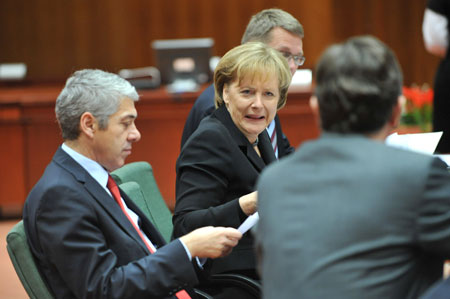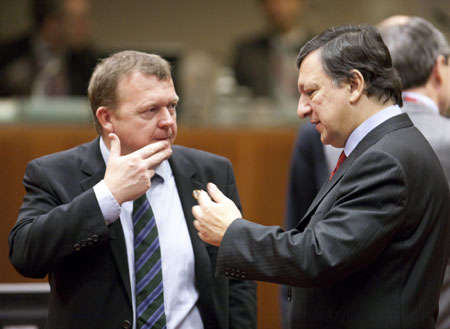EU leaders pledge $3.6 bln annually for climate fund
European Union leaders on Friday pledged 2.4 billion euros (3.5 billion U.S. dollars) annually from 2010 to 2012 to help developing countries tackle climate change.
 |
|
German Chancellor Angela Merkel (C) talks with Slovenian Prime Minister Borut Pahor (R) and Portuguese Prime Minister Jose Socrates (L) during the second-day meeting of the EU summit at EU headquarters in Brussels, capital of Belgium, on Dec. 11, 2009.(Xinhua/Wu Wei)? |
The pledge was seen as a move to boost the ongoing U.N. climate talks in Copenhagen.
Swedish Prime Minister Fredrik Reinfeldt, whose country holds the rotating EU presidency, said at a news conference that the 27-member bloc has made satisfactory contributions to help the poorest countries combat climate change.
Talking about financial assistance for developing countries by 2020, he said the bloc was willing to "contribute their fair share" if other countries made similar contributions.
The European Commission has estimated that some 5 to 7 billion euros (7 to 10 billion dollars) a year is likely to be needed during 2010-2012 and some 100 billion euros (147 billion dollars) a year is needed by 2020 for developing countries to fight climate change.
Reinfeldt also reiterated the EU's stance on climate change, saying that the bloc is always committed to its conditional offer.
He said the EU had pledged to cut greenhouse gas emissions by 20 percent by 2020 compared with 1990 levels and was ready to lift the number to 30 percent if similar pledges were made by developed countries.
European Commission President Jose Manuel Barroso hailed the EU's pledges and said the fund was aimed at helping the poorest countries mostly affected by climate change.
|
 |
|
Danish Prime Minister Lars Lokke Rasmussen (L) talks with European Commission President Jose Manuel Barroso before the start of the second-day meeting of the EU summit at EU headquarters in Brussels, capital of Belgium, on Dec. 11, 2009.(Xinhua/Thierry Monasse)? |
Barroso urged other countries to make similar pledges, saying the future of those countries "depends on our immediate actions."
At the two-day summit, the first since the bloc's reformed Lisbon Treaty took effect on Dec. 1, the leaders also discussed economic, financial and employment situation of the EU, and particularly the exiting strategies and supervision of financial markets.
Barroso said EU leaders were scheduled in February to hold an informal summit to deliberate "the EU 2020 Strategy," which should enable the EU to fully recover from the financial crisis and speed up move towards a smart and green economy.
The EU 2020 Strategy will draw on the merits of the Lisbon strategy, which focused on growth and jobs, but will also address some of its shortcomings, said a statement issued by the European Commission.
Observors here say that EU, the self-claimed leader in battling climate change, pledged to cut its greenhouse gases only by 20 percent by 2020. The pledge has been criticized by developing countries which want the bloc to raise its target to 30 or 40 percent.
EU leaders explained that the bloc's stance on climate change was aimed to put pressure on other key countries and urge them to take concrete steps, which is crucial for success at the Copenhagen conference.
Reinfeld said as other developed countries including the United States acted slow on tackling climate change that "we must see others to make movement. We will show flexibility and ability to take decision if the movement is going to happen."
 0 Comments
0 Comments






